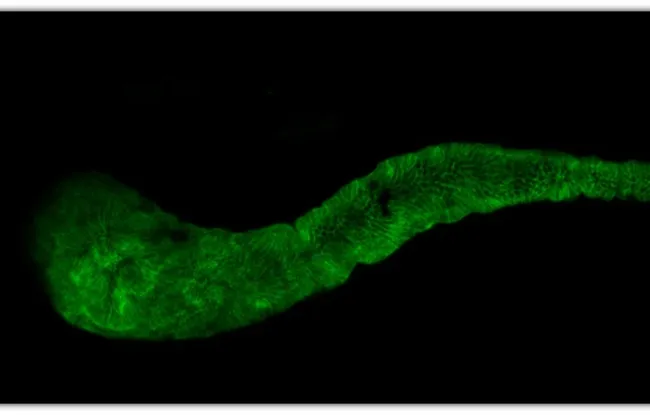- Home >
- Institut Curie News >
- Understanding the communication between the microbiota, immunity and intestinal cells
Pedro Hernandez, Inserm researcher at Institut Curie (Genetics and Developmental Biology unit - Institut Curie, Inserm, CNRS) is the winner of an ERC Starting Grant to explore the basic mechanisms responsible for the crosstalk between the microbiota and intestinal epithelial and immune cells.
The project selected by the European Research Council and led by Pedro Hernandez aims to explore the impact of cytokines - the messengers of immune cells - and the microbiota in the development and maturation of the intestine, using the zebrafish as in vivo model. His research will include dissecting the role of innate lymphoid cells (ILCs) as key cytokine-producing gut leukocytes
I arrived at Institut Curie in September 2019, and this Starting Grant will give a new stimulating impulse to my work. It will enable my team to develop new methodologies to challenge unique concepts and hypotheses
states Pedro Hernandez, head of the “Development and Homeostasis of Mucosal Tissues” team in the Genetics and Developmental Biology unit (Institut Curie/Inserm/CNRS).
This ERC grant constitutes a true recognition of the potential of my research, which I hope will produce promising results during the next 5 years
The original hypothesis for the project is that the post-embryonic development and maturation of the intestine is regulated by cytokine signaling, which itself depends on the interaction with the microbiota, and on the emergence of certain lymphocytes. Based on the zebrafish model, this interdisciplinary project will include classic experiments including live microscopy and genome-editing along with state-of-the-art technologies such as transcriptomics and optogenetics. The project has three specific goals:
- Characterize the role of cytokines in the development and maturation of the intestine;
- Understand how interactions between the microbiota and cytokines control the maturation and physiology of the intestine;
- Uncover the role of innate lymphoid cells (ILC) in this environment. Indeed, these immune cells were recently discovered and found to reside mainly in mucosal tissues like the gut, however, their functions are still unknown.
Combining developmental biology and immunology, the project led by Pedro Hernandez will provide key knowledge about the interactions between the microbiota and the intestine, and key insights into the broad functions of the immune system. This work could also help identify new therapeutic strategies for certain pathologies such as inflammatory diseases of the intestine.
|
The ERC program from the European Research Council is a funding program dedicated to exploratory research, whose only criterion for selection is scientific excellence. Starting Grants are intended for young researchers with an excellent scientific project, and whose career thus far demonstrates the ability to direct research. The maximum funding for ERC Starting Grants is €1.5 M for 5 years. |



